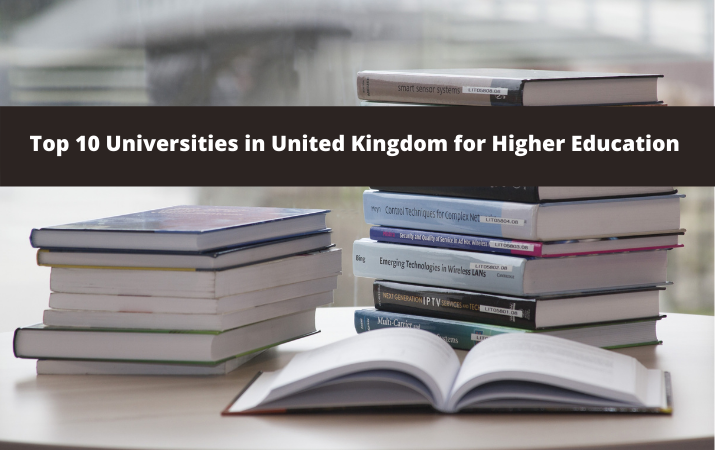Students choice of selecting a university abroad depends heavily on the employability opportunities. Every year “The Times Higher Education” releases ranking list for universities around the world. The ranking is based on 13 performance indicators which measure the institution’s performance across teaching, research, knowledge transfer and international outlook.
Events: Guest Blogging | uLektz Faculty Accomplishment | uLektz Wall of Fame
The list is prepared after compiling answers of several recruiters, chief executives and business managers from top companies in 20 countries.
Let us have a look at the list “Top 10 Universities in United Kingdom for Higher Education for the year 2021”
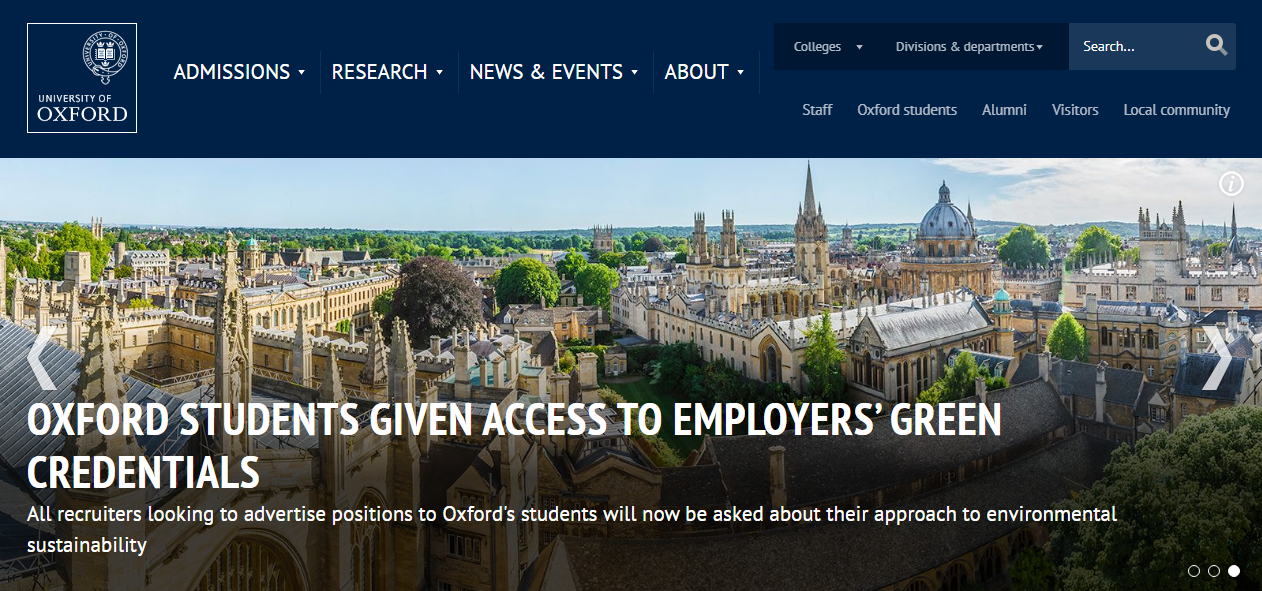
The University of Oxford is the oldest university in the English-speaking world and the world’s second oldest surviving university. While its exact founding date is unknown, there is evidence that teaching took place as far back as 1096.
Located in and around Oxford’s medieval city centre, the university comprises 44 colleges and halls, and over 100 libraries, making it the largest library system in the UK.
Students number around 22,000 in total, just over half of whom are undergraduates while over 40 per cent are international, representing 140 countries between them.
Called the ‘city of dreaming spires’ by Victorian poet, Matthew Arnold, Oxford has the youngest population of any city in England and Wales: nearly a quarter of its residents are university students, which gives Oxford a noticeable buzz.
Oxford has an alumni network of over 250,000 individuals, including more than 120 Olympic medallists, 26 Nobel Prize winners, seven poets laureate, and over 30 modern world leaders (Bill Clinton, Aung San Suu Kyi, Indira Ghandi and 26 UK Prime Ministers, among them).
The university is associated with 11 winners of the Nobel Prize in Chemistry, five in physics and 16 in medicine. Notable Oxford thinkers and scientists include Tim Berners-Lee, Stephen Hawking and Richard Dawkins. The actors Hugh Grant and Rosamund Pike also went to Oxford, as did the writers Oscar Wilde, Graham Greene, Vikram Seth and Philip Pullman.
Oxford’s first international student, named Emo of Friesland, was enrolled in 1190, while the modern day university prides itself on having an ‘international character’ with connections to almost every country in the world and 40% of its faculty drawn from overseas.
As a modern, research-driven university, Oxford has numerous strengths but cites particular prowess in the sciences, having recently ranked number one in the world for medicine (if its Medical Sciences division was a university in its own right, it would be the fourth largest in the UK) and among the top ten universities globally for life sciences, physical sciences, social sciences, and the arts and humanities.
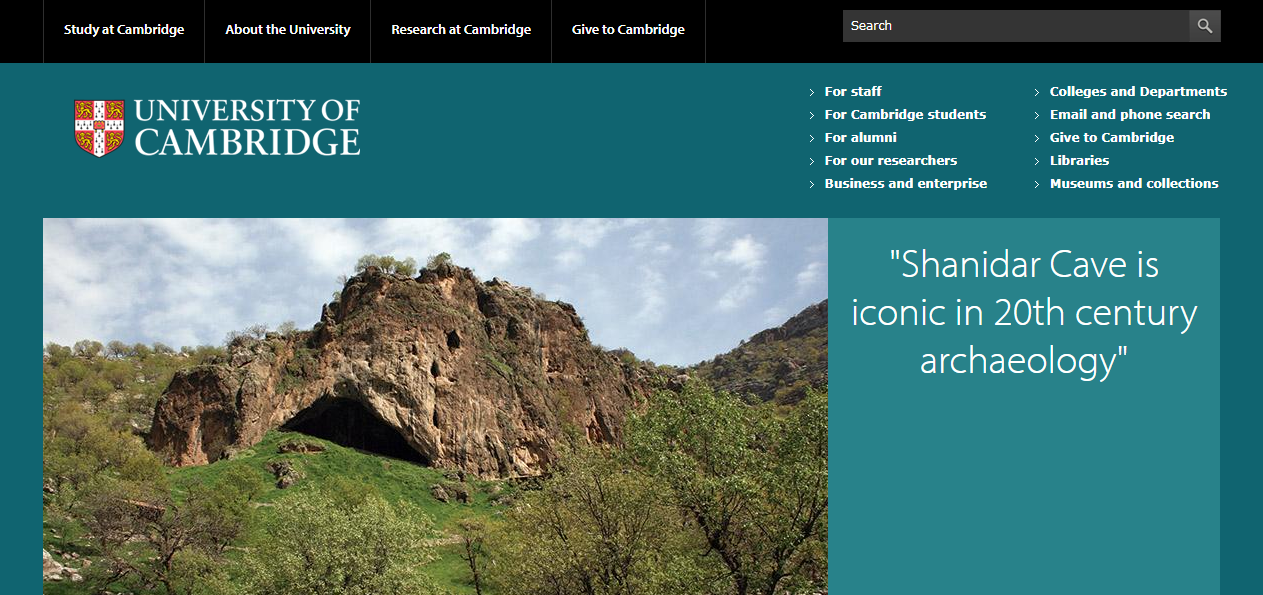
Founded in 1209, the University of Cambridge is a collegiate public research institution. Its 800-year history makes it the fourth-oldest surviving university in the world and the second-oldest university in the English-speaking world.
Cambridge serves more than 18,000 students from all cultures and corners of the world. Nearly 4,000 of its students are international and hail from over 120 different countries. In addition, the university’s International Summer Schools offer 150 courses to students from more than 50 countries.
The university is split into 31 autonomous colleges where students receive small group teaching sessions known as college supervisions.
Six schools are spread across the university’s colleges, housing roughly 150 faculties and other institutions. The six schools are: Arts and Humanities, Biological Sciences, Clinical Medicine, Humanities and Social Sciences, Physical Sciences and Technology.
The campus is located in the centre of the city of Cambridge, with its numerous listed buildings and many of the older colleges situated on or near the river Cam.
The university is home to over 100 libraries, which, between them, hold more than 15 million books in total. In the main Cambridge University library alone, which is a legal depository, there are eight million holdings. The university also owns nine arts, scientific and cultural museums that are open to the public throughout the year, as well as a botanical garden.
Cambridge University Press is a non-school institution and operates as the university’s publishing business. With over 50 offices worldwide, its publishing list is made up of 45,000 titles spanning academic research, professional development, research journals, education and bible publishing.
In total, 92 affiliates of the university have been awarded Nobel Prizes, covering every category.
The university’s endowment is valued at nearly £6 billion.
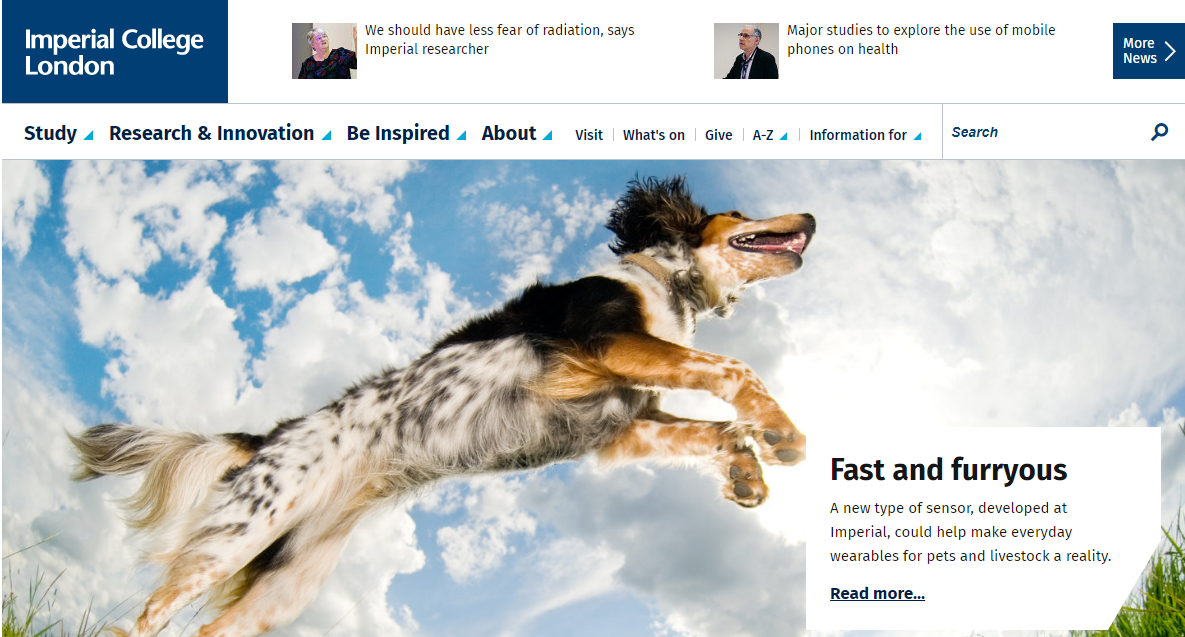
Imperial College London, a science-based institution based in the centre of the capital, is regarded as one of the UK’s leading institutions.
The college has around 15,000 students and 8,000 staff, with a focus on four main areas: science, engineering, medicine and business.
The institution has its roots in the vision of Prince Albert to make London’s South Kensington a centre for education, with colleges going alongside the nearby Natural History Museum, Victoria and Albert Museum and Science Museum.
Imperial was granted its charter in 1907, merging the Royal College of Science, the Royal School of Mines and the City & Guilds College.
The institution boasts 14 Nobel Prize winners, including Sir Alexander Fleming, the discoverer of penicillin.
Famous alumni include science fiction author H.G. Wells, Queen guitarist Brian May, former prime minister of India Rajiv Gandhi, former UK chief medical officer Sir Liam Donaldson, and former chief executive of Singapore Airlines Chew Choon Seng.
The college’s motto is Scientia imperii decus et tutamen, which translates as “Scientific knowledge, the crowning glory and the safeguard of the empire”.
Imperial’s most notable landmark is the Queen’s Tower, a remainder of the Imperial Institute, built to mark Queen Victoria’s Golden Jubilee in 1887.
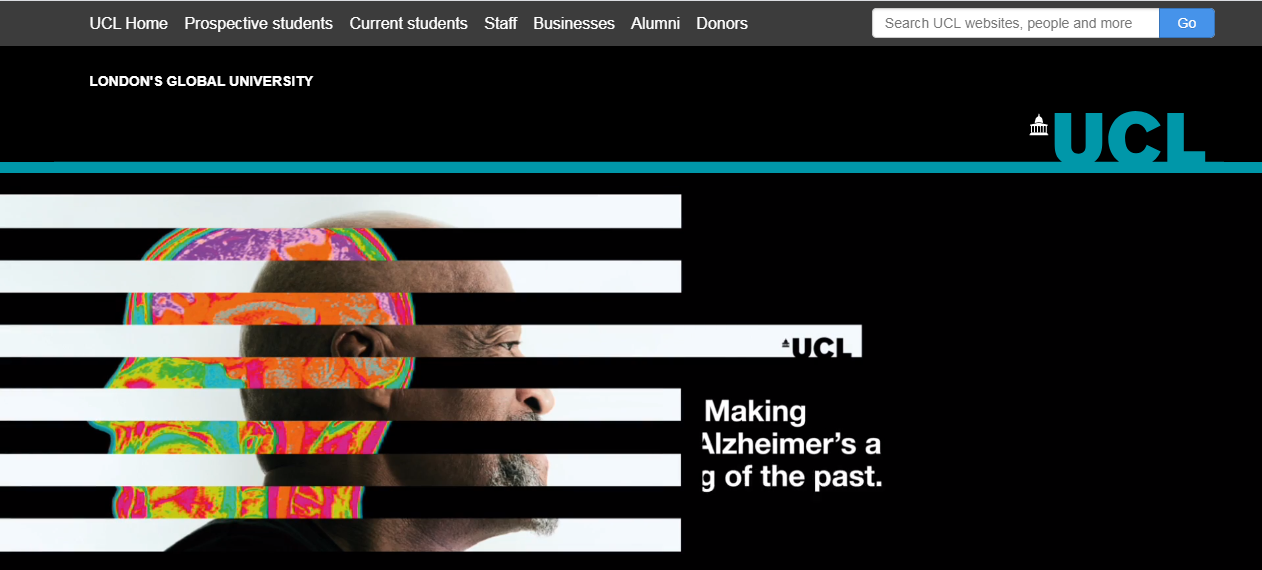
UCL was founded in 1826 to bring higher education to those who were typically excluded from it. In 1878, it became the first university in England to admit women on equal terms as men.
Located in the heart of London, UCL is a constituent college of the University of London and a member of the Russell Group, with approximately 850 professors and over 6,000 academic and research staff.
UCL comprises 11 faculties: Arts and Humanities, Built Environment, Brain Sciences, Engineering, the Institute of Education, Laws, Life Sciences, Mathematical and Physical Sciences, Medical Sciences, Population Health Sciences, and Social and Historical Sciences.
Throughout its history, UCL has been the birthplace of numerous significant scientific discoveries, with 29 Nobel Prizes awarded to UCL students or staff, including William Ramsay, who won the Nobel Prize in Chemistry in 1904 for his discovery of the noble gases.
In addition, the UCL academic community includes 53 Fellows of the Royal Society, 51 Fellows of the British Academy, 15 Fellows of the Royal Academy of Engineering, and 117 Fellows of the Academy of Medical Sciences.
The student body is nearly 36,000-strong and UCL has one of the largest systems of postgraduate study in the country. Nearly 52 per cent of students are engaged in graduate studies.
Students hail from approximately 150 countries worldwide making up more than one-third of the university’s entire student population.
UCL was the first British university to open a campus in Doha, Qatar, where it runs a centre for the study of cultural heritage. It also has a presence in Adelaide, South Australia, which includes a space science and an energy policy institute.
UCL alumni include film director Derek Jarman, the writer Lynne Truss, Baroness Patricia Scotland, who became the UK’s first female Attorney General, and Marie Stopes, who founded Britain’s first family planning clinic.
The university’s Latin motto translates as ‘Let all come who by merit deserve the most reward.’
London School of Economics and Political Science
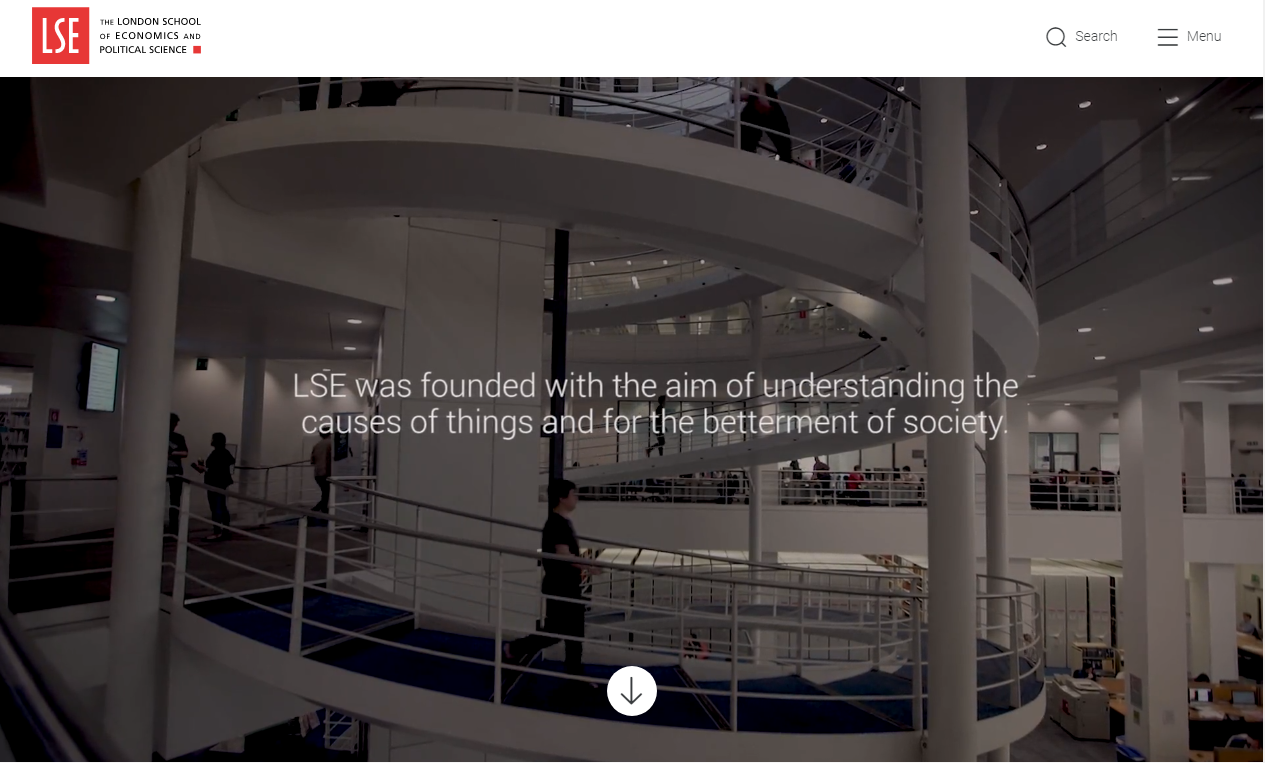
The London School of Economics and Political Science (LSE) is one of the foremost social science universities in the world, specialising in a wide range of social science disciplines, including economics, politics, sociology, law and anthropology.
It was founded in the late 1800s by Fabian Society members Beatrice and Sidney Webb, Graham Wallas and George Bernard Shaw for the purpose of bettering society, ‘by studying poverty issues and analysing inequalities.’
The philosopher Bertrand Russell taught there in 1895-96 and 1937-38, helping to define the LSE’s ethos. In 1900, it joined the federal University of London and has remained a member ever since, rapidly expanding to its current position near Aldwych in central London, where King George V laid the first stone of its ‘Old Building’ in 1920.
The LSE boasts associations with 16 Nobel Prize winners and counts 37 past or present world leaders among its alumni. Bertrand Russell received the Nobel Prize for Literature in 1950, recognising his writing on ‘humanitarian ideals and freedom of thought’, while Mick Jagger attended as an undergraduate in 1961, dropping out after a year to form the Rolling Stones.
British Prime Minister Clement Attlee was an assistant lecturer there in 1912 and one of the first teachers in the new Department of Social Science and Administration. Lord Beveridge separately was appointed director of the LSE in 1937, later authoring the famous Beveridge Report, a cornerstone of the UK’s welfare state.
The LSE students’ union has twice courted controversy in the past half century, first in a series of riots in 1967 to protest the appointment of director Sir Walter Adams, who had worked as a principal in Zimbabwe under white rule. And again in 1989, when students elected Winston Silcott as their honorary president, after Silcott’s murder conviction (later overturned) during London’s infamous Broadwater Farm riot.
Today, the LSE is world-renowned. Home to 9,600 full time students from some 140 countries, it maintains international partnerships with Columbia University in New York, Sciences Po in Paris, Peking University in Beijing, the National University of Singapore and the University of Cape Town.
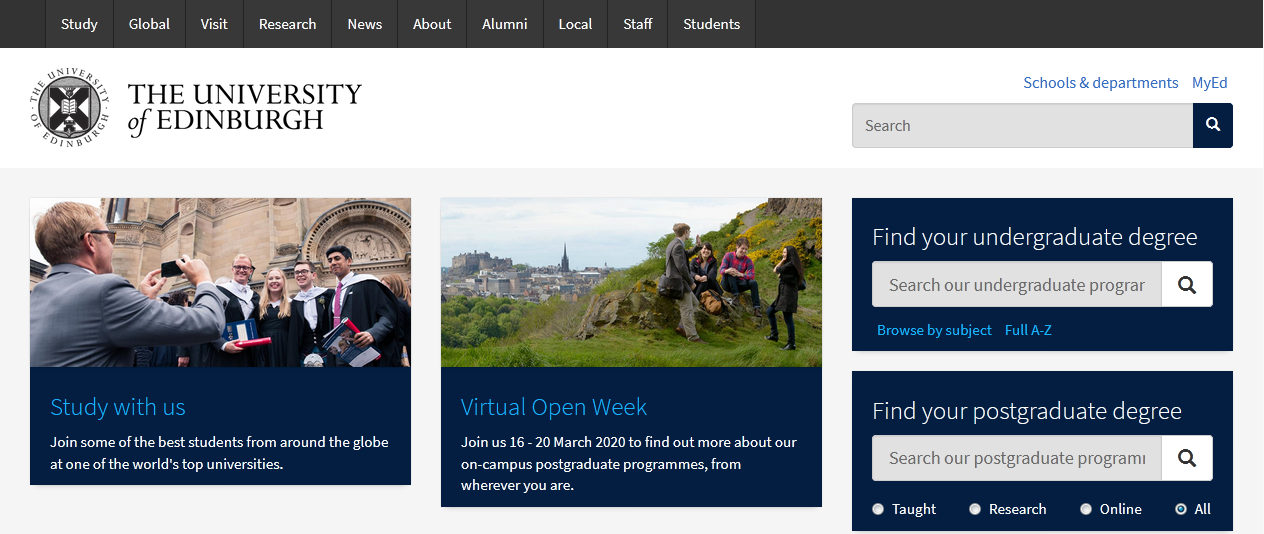
Founded in 1583, the University of Edinburgh (UoE) is the sixth oldest university in the English-speaking world and one of Britain and Ireland’s seven ancient universities.
It is made up of three colleges: Humanities and Social Science, Science and Engineering, and Medicine and Veterinary Medicine. Within these three colleges, there are 20 academic schools.
In total, the university attracts around 35,000 students, the majority of which study within the College of Humanities and Social Science, the largest of its colleges.
Watch Also: Is the coronavirus crisis a chance to rethink the world
Its College of Medicine and Veterinary Medicine is reputed to be a world-leader in its field.
UoE is an internationally-focussed university and welcomes students from all corners of the globe, with the majority coming from China and the United States.
Its students can also take advance of the Go Abroad Fund, which provides grants for 250 or students to have a short-term international experience each year. Additionally, students are also encouraged to either study or work abroad as part of their course.
The university receives over £200 million in research income. It spends over £26 million on prizes, scholarships, studentships and bursaries. At around £317 million, it has the third largest endowment of any UK university after Oxford and Cambridge.
A total of 20 Nobel laureates are affiliated with the University of Edinburgh. These include winners of Prizes in Physics, Chemistry, Physiology or Medicine, Peace, Literature and the Memorial Prize in Economic Science.
Alumni include Charles Darwin, David Hume, Alexander Graham Bell and Sir Arthur Conan Doyle, among many others.
Situated in the heart of the historic capital of Scotland, the city of Edinburgh is home to the Scottish Parliament, an ancient volcanic rock and an iconic castle.
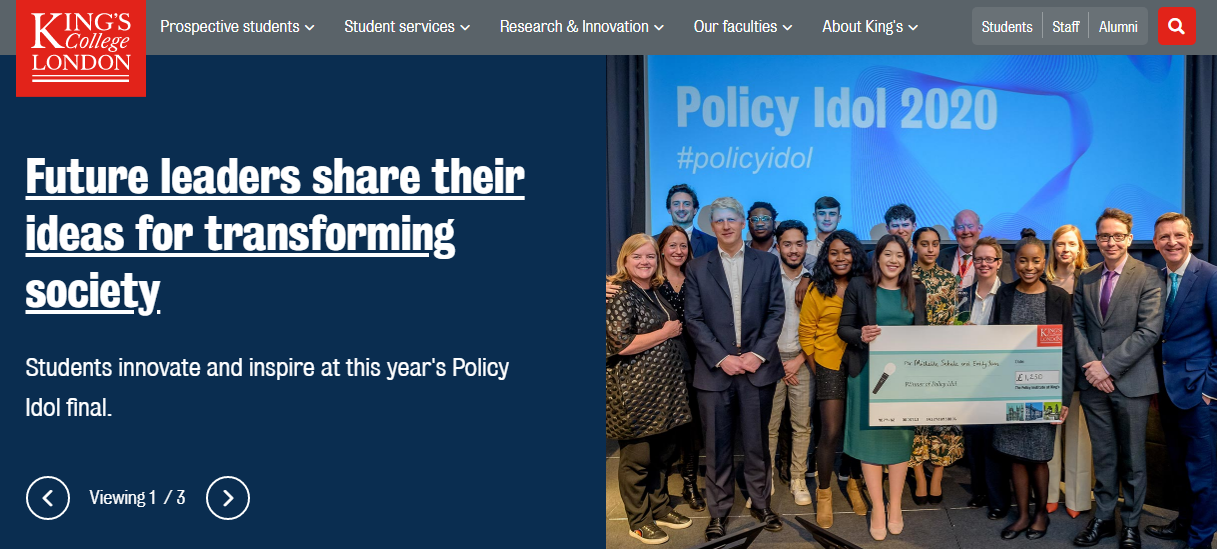
King’s is a leading university providing world-class teaching and cutting-edge research. We are ranked sixth in the UK for the quality and quantity of research activity (Research Excellence Framework 2014). King’s has played a major role in many of the advances that shape modern life, such as the discovery of the structure of DNA and research that led to the development of radio, television, mobile phones and radar. King’s continues to lead the way on research and pioneers new ideas to make the world a better place.
King’s is London’s most central university, with five campuses linked through the heart of the capital, enabling us to build partnerships with key London institutions and form international conversations. We collaborate on research projects, share teaching resources and create internship opportunities to enhance our students’ experience. Current partners include the British Library, British Museum, National Gallery, Shakespeare’s Globe, Southbank Centre, Tate Modern, and more. Our central location and varied partnerships allow students to get connected in one of the world’s most dynamic cities.
King’s is not only an enriching experience from an academic perspective – we have a diverse and active student community, with almost 30,000 students from some 150 countries worldwide.
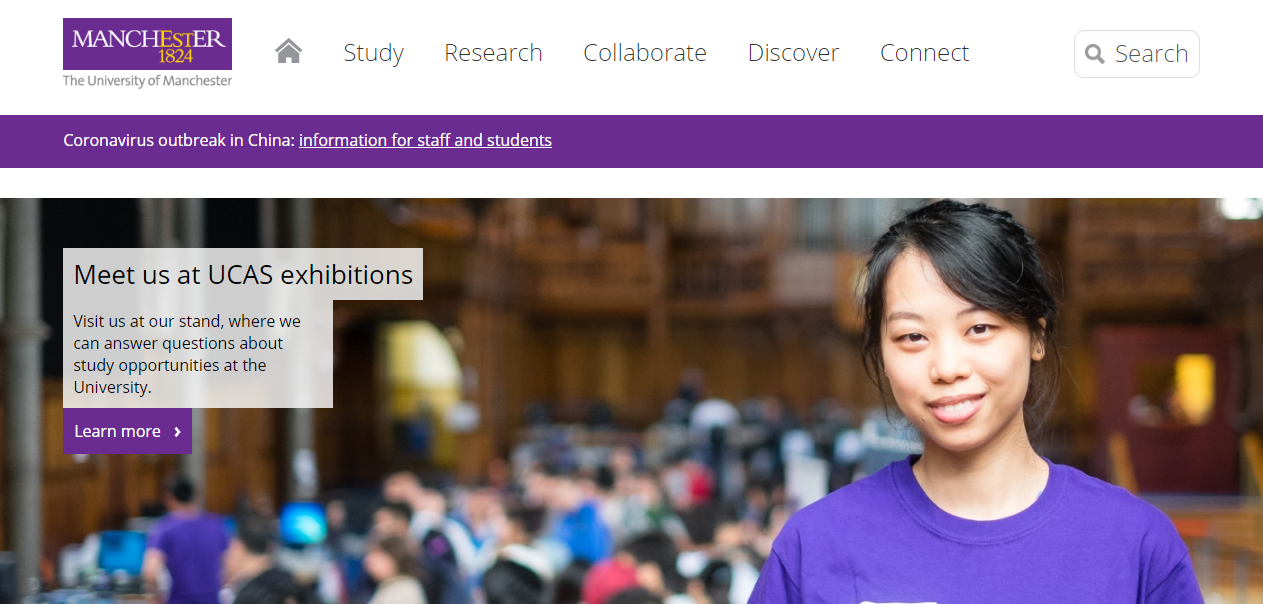
The University of Manchester is a Russell Group University. With almost 40,000 students, it boasts the largest student community in the UK.
With all its higher education institutions combined, the city of Manchester has the largest student population in Europe, which makes for a lively and welcoming atmosphere for its student body, that come from all over the world.
Teaching at the university is divided into four faculties, each housing individual schools. These are the faculties of Life Sciences, Humanities, Medical and Human Sciences, and Engineering and Physical Sciences.
The university campus, situated on Oxford Road, is the largest estate in UK higher education, spanning 270 hectares with 245 buildings, 24 of which are listed. It is within walking distance from the city centre and close to Curry Mile, a road famous for its curry houses and Middle Eastern supermarkets.
Travelling up Curry Mile, you find yourself in Fallowfield, the student village that is home to many of the university’s halls of residence as well as a vast array of pubs, bars and food outlets.
The university’s library holds more than four million printed books and manuscripts, over 41,000 electronic journals and 500,000 e-books. It is also one of just five National Research Libraries. The John Ryland’s Library, located in town, is a grade-I listed neo-Gothic building that houses 250,00 printed volumes and more than a million in its archives.
Other notable buildings owned by the university are the Whitworth art gallery, which has benefited from a recent £15 million renovation, the Manchester Museum, and the Jodrell Bank Observatory in Cheshire.
Manchester claims to having the largest alumni network of any campus-based university in the UK, comprising more than 300,000 people from over 190 countries. Among them are the actor Benedict Cumberbatch and the physicist Brian Cox.
In addition, the university also counts 25 Nobel Prize winners among its current and former staff and students.
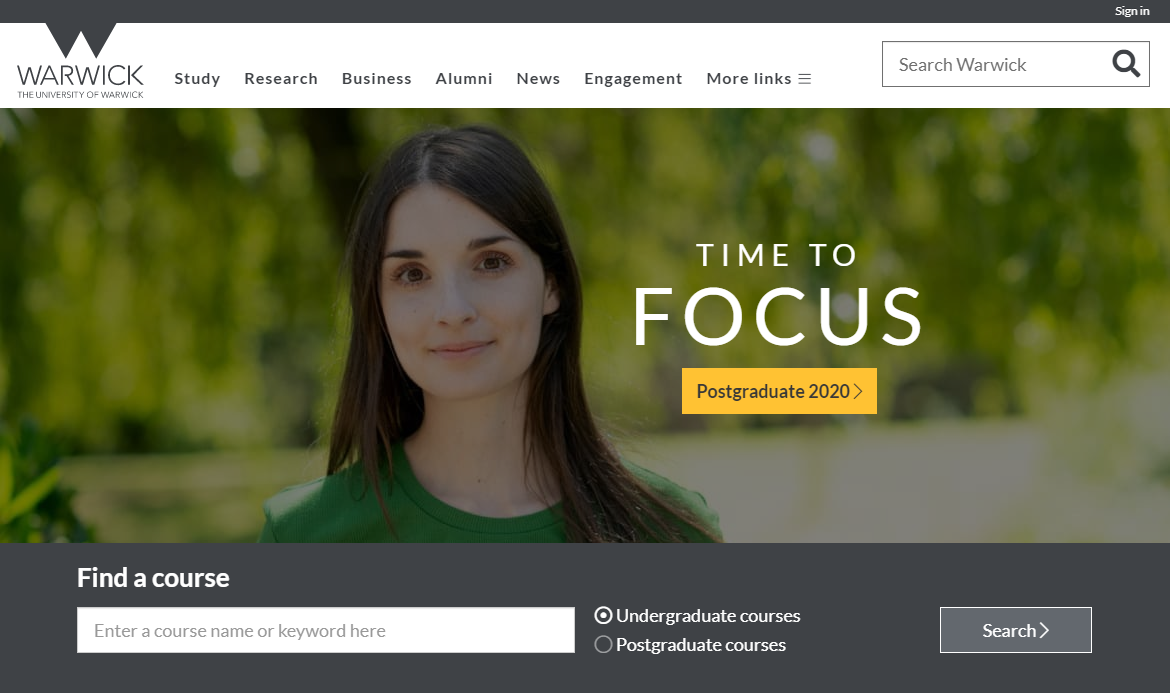
The University of Warwick, based on the outskirts of the city of Coventry, England, first opened its doors in 1965.
Academically, the university is known also for its commitment to research. Warwick maintains around 30 academic departments, organised into four faculties: Arts, Medicine, Science and Social Science. In support of this, the university has an extensive library boasting more than 13 kilometers’ worth of manuscripts. Smaller campuses are also maintained at satellite sites.
In terms of recreation, Warwick has a number of different student societies providing for a wide range of interests. In addition, the university’s student union is one of the largest in the UK. Many different events are held on campus, such as music concerts as well as visits from guest speakers.
Some of the most famous alumni of Warwick include Conservative politician David Davis, and former Nigerian president Yakubu Gowon.
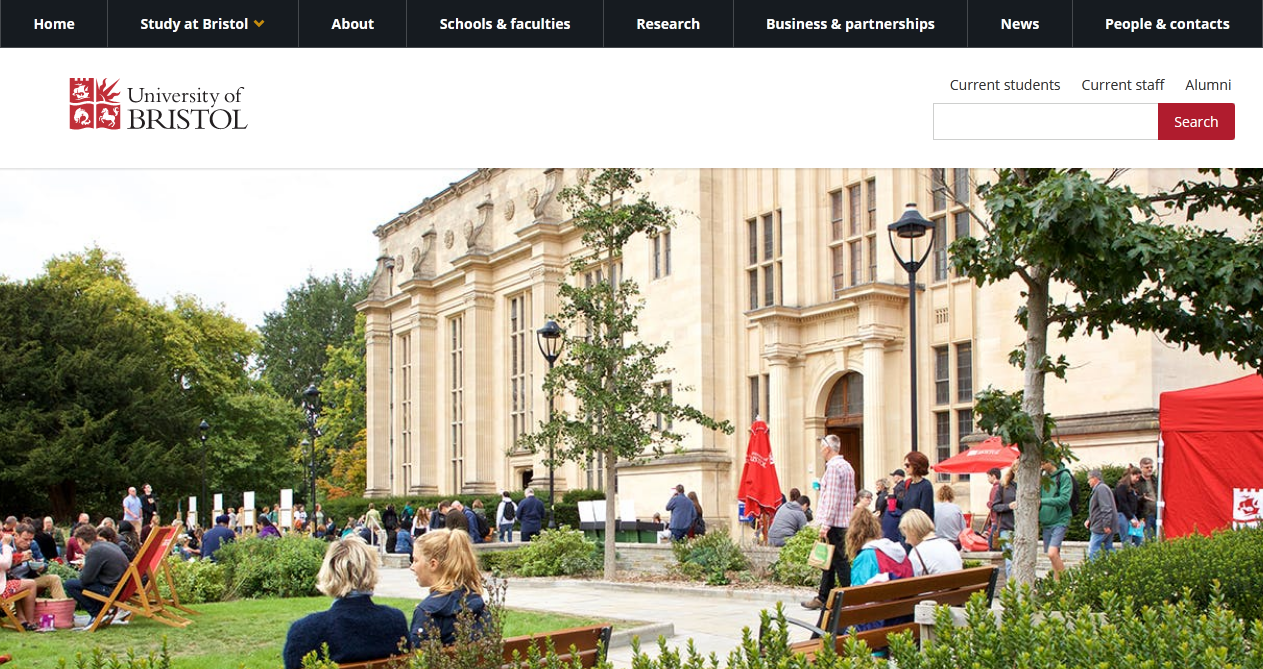
Founded in 1876, the University of Bristol combines academic excellence with innovation. Students can choose from more than 500 courses at all levels, from foundation degrees to PhDs.
Ranked joint fifth in the UK for research,* the University is home to more than 25,000 students from across 150 countries. The main campus is at the heart of the historic but vibrant city of Bristol, just a two-hour journey from London. With its diverse culture, independent spirit and acres of green space, the city was named the UK’s best place to live by the Sunday Times in 2017.
Bristol graduates are influential in academia, policy and practice across the world. The University’s alumni network includes leading figures in science, industry, politics and the arts.
Follow us on Facebook, Twitter, LinkedIn.
Watch us Click here








